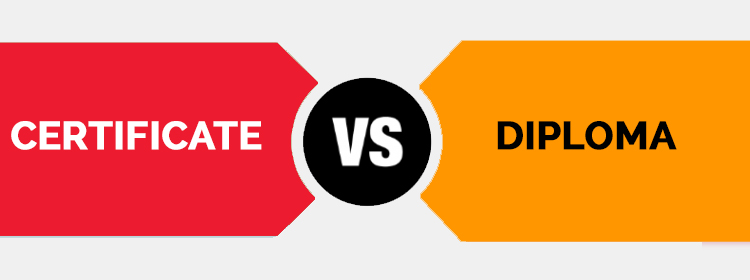
What is the difference between the Certificate IV and the Diploma? What is the difference between a Diploma and a Bachelor Degree? To understand this, you have to understand the Australian Qualifications Framework (AQF) – a system which governs qualifications issued by all education and training providers in Australia.
The AQF has 10 levels and starts at the Senior Secondary Certificate in Education (High School) and progress through to a Doctoral Degree, providing the standards for Australian qualifications and the learning outcomes for each AQF level and qualification type.
A very brief example of each level of the AQF is summarised below and shows what qualifications are represented in each level, and what is expected of a student upon completion of that level.
| Level |
Qualification Type |
Skills |
| 1 |
Certificate I |
Graduates of a Certificate I will have:
- basic skills to participate in everyday life and further learning
- cognitive and communication skills to receive, pass on and recall information in a narrow range of areas
- technical skills involving the use of tools appropriate to the activity and use of basic communication technologies
|
| 2 |
Certificate II |
Graduates of a Certificate II will have:
- cognitive skills to access, record and act on a defined range of information from a range of sources
- cognitive and communication skills to apply and communicate known solutions to a limited range of predictable problems
- technical skills to use a limited range of equipment to complete tasks involving known routines and procedures with a limited range of options
|
| 3 |
Certificate III |
Graduates of a Certificate III will have:
- cognitive, technical and communication skills to interpret and act on available information
- cognitive and communication skills to apply and communicate known solutions to a variety of predictable problems and to deal with unforseen contingencies using known solutions
- technical and communication skills to provide technical information to a variety of specialist and non-specialist audiences
- technical skills to undertake routine and some non-routine tasks in a range of skilled operations
|
| 4 |
Certificate IV |
Graduates of a Certificate IV will have:
- cognitive skills to identify, analyse, compare and act on information from a range of sources
- cognitive, technical and communication skills to apply and communicate technical solutions of a non-routine or contingency nature to a defined range of predictable and unpredictable problems
- specialist technical skills to complete routine and nonroutine tasks and functions
- communication skills to guide activities and provide technical advice in the area of work and learning
|
| 5 |
Diploma |
Graduates of a Diploma will have:
- cognitive and communication skills to identify, analyse, synthesise and act on information from a range of sources
- cognitive, technical and communication skills to analyse, plan, design and evaluate approaches to unpredictable problems and/or management requirements
- specialist technical and creative skills to express ideas and perspectives
- communication skills to transfer knowledge and specialised skills to others and demonstrate understanding of knowledge
|
| 6 |
Advanced Diploma
Associate Degree |
Graduates of an Advanced Diploma will have:
- cognitive and communication skills to identify, analyse, synthesise and act on information from a range of sources
- cognitive and communication skills to transfer knowledge and skills to others and to demonstrate understanding of specialised knowledge with depth in some areas
- cognitive and communication skills to formulate responses to complex problems
- wide-ranging specialised technical, creative or conceptual skills to express ideas and perspectives
|
| 7 |
Bachelor Degree |
Graduates of a Bachelor Degree will have:
- cognitive skills to review critically, analyse, consolidate and synthesise knowledge
- cognitive and technical skills to demonstrate a broad understanding of knowledge with depth in some areas
- cognitive and creative skills to exercise critical thinking and judgement in identifying and solving problems with intellectual independence
- communication skills to present a clear, coherent and independent exposition of knowledge and ideas
|
| 8 |
Bachelor Honours Degree
Graduate Certificate
Graduate Diploma |
Graduates of a Bachelor Honours Degree will have:
- cognitive skills to review, analyse, consolidate and synthesise knowledge to identify and provide solutions to complex problems with intellectual independence
- cognitive and technical skills to demonstrate a broad understanding of a body of knowledge and theoretical concepts with advanced understanding in some areas
- cognitive skills to exercise critical thinking and judgement in developing new understanding • technical skills to design and use research in a project
- communication skills to present a clear and coherent exposition of knowledge and ideas to a variety of audiences
|
| 9 |
Masters Degree |
Graduates of a Masters Degree (Coursework) will have:
- cognitive skills to demonstrate mastery of theoretical knowledge and to reflect critically on theory and professional practice or scholarship
- cognitive, technical and creative skills to investigate, analyse and synthesise complex information, problems, concepts and theories and to apply established theories to different bodies of knowledge or practice
- cognitive, technical and creative skills to generate and evaluate complex ideas and concepts at an abstract level
- communication and technical research skills to justify and interpret theoretical propositions, methodologies, conclusions and professional decisions to specialist and non-specialist audiences
- technical and communication skills to design, evaluate, implement, analyse and theorise about developments that contribute to professional practice or scholarship
|
| 10 |
Doctoral Degree |
Graduates of a Doctoral Degree will have:
- cognitive skills to demonstrate expert understanding of theoretical knowledge and to reflect critically on that theory and practice
- cognitive skills and use of intellectual independence to think critically, evaluate existing knowledge and ideas, undertake systematic investigation and reflect on theory and practice to generate original knowledge
- expert technical and creative skills applicable to the field of work or learning
- communication skills to explain and critique theoretical propositions, methodologies and conclusions
- communication skills to present cogently a complex investigation of originality or original research for external examination against international standards and to communicate results to peers and the community
- expert skills to design, implement, analyse, theorise and communicate research that makes a significant and original contribution to knowledge and/or professional practice
|
One of the key objectives of the Australian Qualifications Framework is to facilitate pathways to, and through, formal qualifications.
AQF qualifications link with each other in a range of learning pathways between schools, VET and higher education and work as an individual’s learning and career ambitions require. The AQF provides for flexible, transparent and systematic learning pathways aims to remove boundaries between educational sectors.
For more information about the AQF please go to http://www.aqf.edu.au/





